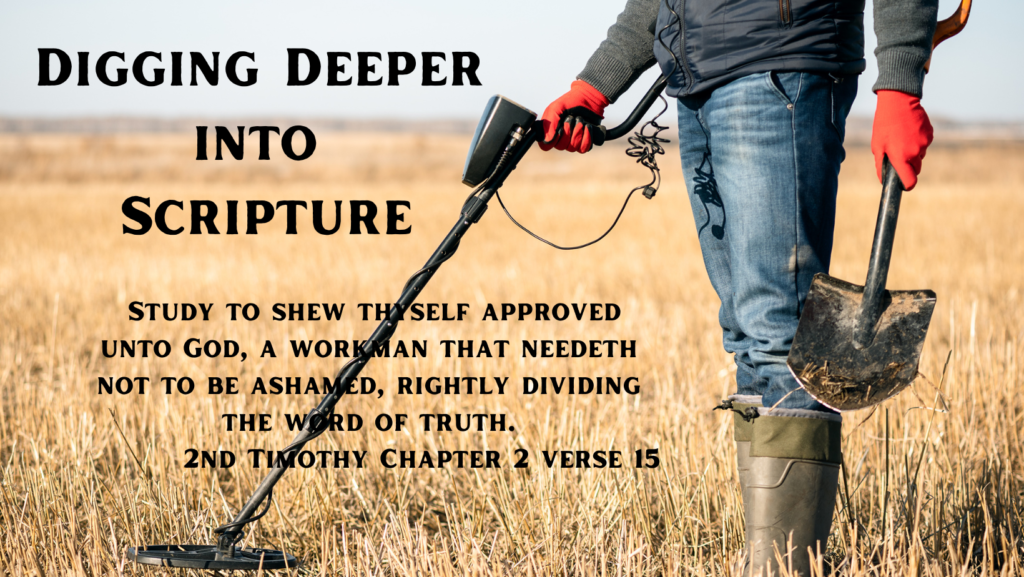
PART 1
John opens this chapter with a powerful message. When it comes to God’s love, he describes it by using a word that has a ‘strong expression and meaning. One translation describes John’s expression of God’s love by using the word “extravagant.” (The Voice).
Think of it this way; extravagant means to go beyond the norm. Some people are extravagant in the way they spend their money, for example; spending way too much on material things.
Extravagant means, nothing but the best of everything! God’s love towards us, simply put is, He wants us to have nothing less than the best of His love. His love is ‘over the hill,’ ‘inexpressible,’ ‘beyond measure’, ‘beyond explanation,’ ‘beyond understanding,’ and, it never changes.
As human beings, I believe we will always struggle with accepting the fullness of God’s love that He has for us. God’s love is far too rich and far too deep for us humans to fully comprehend. One thing is for sure; try to understand all you want, question all you want, and even throw your hands up in frustration all you want (when doubting God’s love). It still won’t change a thing. God’s love for us is far beyond our human understanding. But thankfully, it is not beyond our reach of acceptance.
Whenever you struggle about whether or not God loves you, read, over and over and over again Romans 8:35-39.
35 Who shall separate us from the love of Christ? Shall tribulation, or distress, or persecution, or famine, or nakedness, or peril, or sword? 36 As it is written:
“For Your sake we are killed all day long;
We are accounted as sheep for the slaughter.”
37 Yet in all these things we are more than conquerors through Him who loved us. 38 For I am persuaded that neither death nor life, nor angels nor principalities nor powers, nor things present nor things to come, 39 nor height nor depth, nor any other created thing, shall be able to separate us from the love of God which is in Christ Jesus our Lord.
PART 2
After John finishes talking about God’s amazing love that He has for us, John suddenly dives right into talking about sin in our lives. At first, I thought, why would John go from talking about something beautiful and positive as God’s love, to talking about something that is ugly and negative – ‘sin‘. Then it came to me. “Priority!”
John started off with the number one topic of importance in a believers life and that is how much God loves us!. Then he spoke about the next priority. He deals with the one thing that interferes with accepting God’s love, and that is ‘sin.’
By doing so, John’s spiritual message to all God’s creation is that there is nothing more important, more powerful and more assuring than God’s love for His creation; so much so, that even sin cannot separate us from God’s love once we receive it.
Romans 8:38-39 38 For I am persuaded that neither death nor life, nor angels nor principalities nor powers, nor things present nor things to come, 39 nor height nor depth, nor any other created thing, shall be able to separate us from the love of God which is in Christ Jesus our Lord.
PART 3
John also talks about ‘habitual sin‘; sin that is repeated over and over again, but done knowingly and willingly. This, according to John, is a dangerous situation to be in. When we think of doing something by habit we think of something that we can’t control, but want to.
When John speaks of ‘habitual sin’ he’s referring to the willingness to do something over and over because we want to. He makes it clear that one who is, and remains in this way by choice, is one who does not truly know the Lord. In the spiritual realm there is a difference between ‘sinning‘ and ‘habitual sinning‘.
Sinning is ‘stumbling.’ It is temporarily losing sight of God and focusing on ourselves. But then we realize we have strayed and therefore, we repent and turn back to God.
Habitual sinning, as John puts it, is the ‘ongoing disobedience towards God that does not include repentance.” Ongoing sinning without ongoing repentance is intentional and is a dangerous path to continue on, and if not addressed can lead to a person not entering the kingdom of God.
1 Cor 6:9-11 9 Do you not know that the unrighteous will not inherit the kingdom of God? Do not be deceived. Neither fornicators, nor idolaters, nor adulterers, nor homosexuals, nor sodomites, 10 nor thieves, nor covetous, nor drunkards, nor revilers, nor extortioners will inherit the kingdom of God. 11 And such were some of you. But you were washed, but you were sanctified, but you were justified in the name of the Lord Jesus and by the Spirit of our God.
The best way of keeping sin from becoming habitual sin and taking over our lives, is to stay close to God on a daily basis. Be faithful in reading His word and be reminded of His love for us in Romans 8:35-39.
The only thing that can separate you from the love of God is your personal choice to sin willfully after you have received the knowledge of the truth.
Heb 10: 26-27; 31 26 For if we sin willfully after we have received the knowledge of the truth, there no longer remains a sacrifice for sins, 27 but a certain fearful expectation of judgment, and fiery indignation which will devour the adversaries.; 31 It is a fearful thing to fall into the hands of the living God.
Amen
Pastor Wayne Gardner
Carl Peddle
